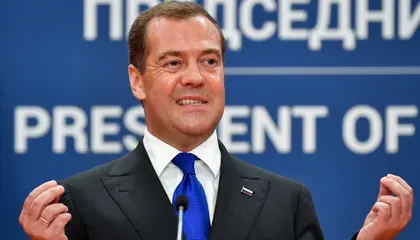Top Russian officials have accused Kyiv and its allies of bringing humanity closer to World War 3 and prolonging the war in Ukraine in some eyebrow-raising reactions at the end of the first day of the NATO summit in Vilnius.
While President Zelensky expressed frustration that no firm timetable for his country joining the military alliance was laid out, his anger was dwarfed by that coming out of the Kremlin.
Why is Russia so angry?
Russian officials have been somewhat frustrated ever since their plan to capture Kyiv and take control of Ukraine in a few weeks in a “special operation” was scuppered by Ukrainian resistance.
To explain their lack of success, the Kremlin has long sought to portray their full-scale invasion as a war against not just Kyiv, but the West, particularly NATO countries.
Although NATO leaders on Tuesday didn’t lay out a timetable for Ukraine joining, they did shorten the eventual process Kyiv would have to go through to enter the alliance and emphasized that “Ukraine’s future is in NATO.”
In a bid to reassure Zelensky, G7 nations are expected to issue a declaration on how they will help Ukraine defeat Russia and deter any new aggression in the coming years.
What did Russia say?
Dmitry Medvedev, the deputy secretary of Russia’s powerful Security Council, went into full-hyperbole mode, saying: “The completely crazy West could not come up with anything else... In fact, it’s a dead end. World War Three is getting closer.

Drone Wars –Technology, Tactics, Strategy, Countermeasures, Legislation
“What does all this mean for us? Everything is obvious. The special military operation will continue with the same goals.”
While the tone of Medvedev’s comments might not come as a surprise – he’s well known for making outlandish statements – they were echoed in a slightly calmer fashion by Foreign Minister Sergei Lavrov.
In an interview with the Indonesian newspaper Kompas ahead of meetings with his Southeast Asian counterparts in Jakarta this week, Lavrov lambasted the United States and its allies for supporting Ukraine.
“It will continue until the West abandons its plans to maintain dominance and its obsession with inflicting a strategic defeat on Russia through the hands of its puppet, Kyiv,” he said of the war the Kremlin started.
“There has been no sign of a change in their position, and we are seeing how America and its accomplices are continuously pumping weapons into Ukraine and pushing [Zelensky] to continue fighting.”
What does Lavrov expect Ukraine’s allies to do?
Lavrov praised what he called Jakarta’s independent foreign policy on the conflict. President Joko Widodo was the first Asian leader to visit both Moscow and Kyiv after the full-scale invasion began.
He then said Western nations were “ignoring initiatives coming from developing countries” after Kyiv did not take up Widodo’s offer to mediate or a controversial proposal from Indonesia’s defense minister that referendums be held in the occupied parts of eastern Ukraine.
Widodo’s plan would effectively reward Russia with great swathes of Ukrainian land, condemn millions of Ukrainians to living under Russian occupation and is obviously a non-starter for Kyiv.
Was there any other reaction from Russia?
There certainly was, only this was of a very different type indeed – Ukraine said on Wednesday, it had shot down 11 Russian drones overnight in a second consecutive night of attacks on the capital Kyiv.
"A total of 15 kamikaze drones were involved in the strike. Eleven of them were destroyed in the areas of responsibility of the Centre and East air commands," Ukraine's air force said on social media.
Russian President Vladimir Putin launched the biggest attack on a European country since World War II when he ordered the full-scale invasion of Ukraine on February 24, 2022.
Since then, more than 150,000 people have been killed and wounded on both sides, according to Western estimates.
You can also highlight the text and press Ctrl + Enter






